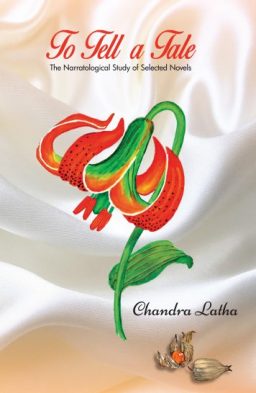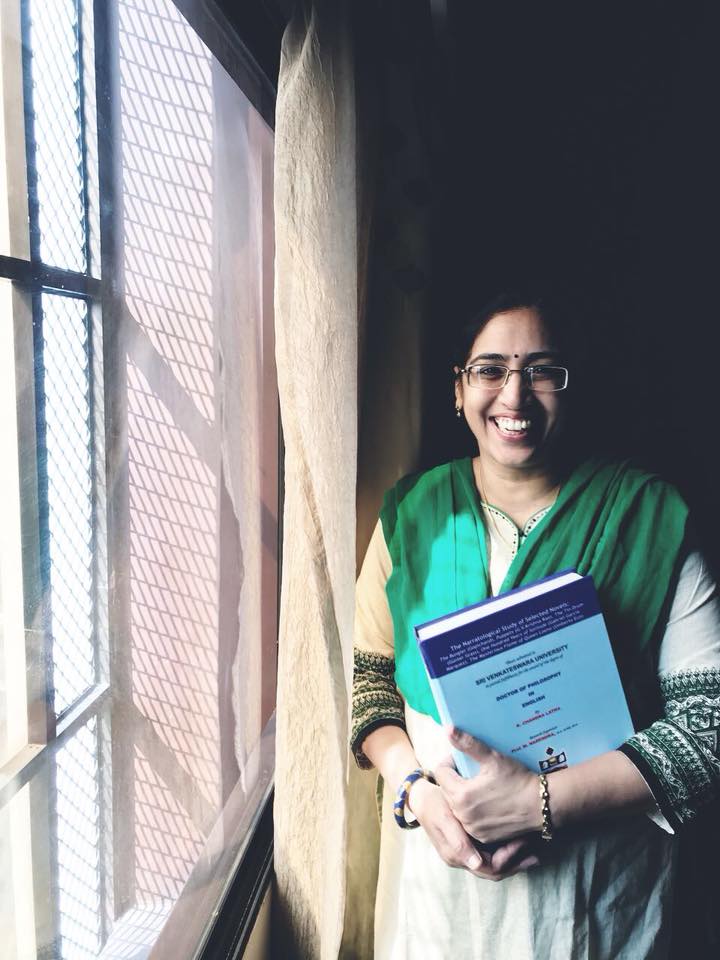
To tell a tale-15
(Chapter-3 Part-1)
-Chandra Latha
A Cup of Brewed Coffee: Puppets
G.V. Krishna Rao
It’s boiled. It’s steeped.
It’s made into steaming hot coffee brimming creamy soft lather
to awaken one from the long night’s hard sleep,
out of the illusion of dreams and the confusion of hangovers.
It’s the perfect mixture of ingredients. It’s refreshing. It’s stimulating.
It’s bitter. The taste that lingers on for the rest of the day!
A cup of brewed coffee!
***
GV Krishna Rao’s Novel Puppets is brewed out of the socio-political tumult of post independent India. G.V.Krishna Rao, (Gavini Venkata Krishnaiah, as per his school records) was born on 15.11.1914 in Kuchipudi village, Tenali Taluq, Andhra Pradesh. In an autobiographical essay, Dr. G.V.Krishna Rao wrote that his parents were not literates but they were keen to get him educated. Born in an agrarian family, he enjoyed going to fields than attending classes. Later, with his aunt’s encouragement, he completed his high school in Turumella and Kolluru. He wrote a novel and a satakam (Compilation of hundred poems) before he left the school.
He was graduated in BA from AC College, Guntur in 1937. He wrote Varudhini a khanda kaavya (Classic Text) during this period. He enrolled in MA English literature at Kasi (Benaras), but he could not complete his course because of the financial problems. He returned home in 1941 and he ventilated his frustration and anguish in a play, bikshapatra (the begging bowl) which was selected as a national play by All India Radio and translated it into 16 languages and broadcasted. After working as a journalist in Andhra Prabha, along with eminent intellectuals of the period like, Narla VenkateswaraRao and Sri Sri for some time, he left it because of his independent ideology. Later, he worked as a journalist in Desaabhimaani and Vijaya Prabha. In 1955, he received PhD from Madras University for his thesis on Pingali Suranna’s Kalpurnodayam. He published Keelubommalu (1951) during this period. He worked as a lecturer during 1952-1962. In 1963, he joined All India Radio, Vijayawada as the programmer and producer of “Telugu Spoken Word”, and he continued there until he got retired in 1973. He breathed his last on 23rd August, 1979.
G.V.Krishna Rao was a scholar in Sanskrit, English and Telugu. He studied the eastern and western philosophies and showed passionate interest in politics, sociology, history and psycho-analysis. He considered the “Tone” (dhwani) of Indian Aesthetics as the paradigm of literary art. Tone, is formally defined as “A writer’s attitude towards the subject, audience, and self.” He believed that life and art are not different entities but, they are one and the same. Life is like a never-ending flow which has neither the beginning nor the end. It’s infinite and endless.
He studied classics, ancient grammatical works on his own. His high school teacher, Sastry, told him, “Writing long, meandering phrases is not good. Beatific meaning is important. Unless there is efficacy, one should not use a word that is not comprehensible instantaneously. A document must always be lucid and simple as like a peeled banana. That is the greatest writing.” (G.V.Krishna Rao. Puppets. Translated from the Telugu original by D. Kesava Rao. 1997, Macmillan India Limited, SBN 033392326X. Pg. 3) Then Krishna Rao realised the essence and beauty of colloquial prose.
Gopichand was the major influence on G.V.Krishna Rao and like Gopichand he too acquired a taste for western literature and narrative styles and studied existentialism and psycho-analysis. The association with the intellectuals of Tenali like Gopichand, Chakrapani, Kodavatikanti Kutumbarao, Chalam, Sanjiva Dev and Abburi Varada Rajeswra Rao helped him to acquire clarity of thought .
Gopichand who introduced Marxism, MN Roy and his Radical Humanism to Krishna Rao. The historic speech of MN Roy at the end of the second world war had great influence on Krishna Rao. After realising the limitations of Marxist leaders of the time, Krishna Rao said, “…all these days I have been praying the dung dolls!” (Puppets, Pg. 3)
Krishna Rao began writing Puppets, in the classical structural form and style. But, Krishna Rao quickly shifted to colloquial Telugu when he realised that the text demanded simple and straight narration. But, Krishna Rao retained the invocation an important feature of the epics, which provides an extra flavour to the narrative and sets the required tone and mood.
In Keelu bommalu [Puppets] Krishna Rao bemuses, “What does freedom mean? How humans are losing it? What is the way to regain it? To what extent, the economic and political matters are influencing human lives? What is the duty of individuals?—inciting this pursuit of knowledge is the goal of keelu bommalu,” (G.V. Krishna Rao. Puppets, Introduction (Pg.) keelu bommalu is translated into English by Devisetty Kesava Rao, (1937-2012) and it was published by Macmillan in 1997. Besides novels, Krishna Rao also wrote poetry and literary criticism.
Fabula or the story of puppets asserts that a lie once uttered takes its own irreversible course destroying everything that passes through.
Syuzhet or the Plot of the novel deals with the life of Pullayya who lies that he once signed as a surety of Chandra Shekharam at the local money lender, Seth Lalchand. That lie changes the intra personal relations of entire villagers and ultimately sends Chandra Shekharam to jail. Greed and vindictiveness of the people spoil the harmony of the villages and the casts and fanaticism crated a havoc.
A lie once uttered, that can never be withdrawn, takes its own organic growth effecting everyone in its path. The consequences are both personal and social.
Each chapter gives scope for reversal of the lie, but the lie grows bigger than the truth and establishes itself as the truth. The reader will be curious whether the truth will be revealed at any point of time. Thirty five chapters flow in continuous narration. There are no breaks or hindrance. Nowhere the reader feels it necessary to referring back. The narration is plain, simple and fluid.
As Dr. Vijaya Sri points out in the Introduction to the novel Puppets, the title reflects the “mechanistic nature of human life. The levers here are controlled by the corrupt social system .Individual lives are determined socially, culturally and psychologically to such an extent that independent thinking and initiative are altogether eliminated, and all men and women are reduced to the level of mere puppets.” (Puppets, Introduction) Nidadavolu Malathi also asserts the same when she says, “Regarding the title of the book, puppets, the perception usually is that we are Puppets in the hands of some unknown force; there is a player who pulls the strings and make us act.” (Puppets, 10 and 11)
Understanding the narrative tone of the novel, it is quite clear that this social satire is given a title with a didactic intention to never be puppets and grow as autonomous individuals and explore human potential.
Nidadavolu Malathi concludes, “The message is individuals need to reflect and decide what dharma is for them by themselves. It is not something that somebody would provide for them. In that sense, there is no puppeteer. Each person is his own puppeteer. The author has shown extraordinary skill in depicting this angle in the story.”
The Invocation sings, “O heart! “Weep not for your mother land.” It clearly reflects the despair of the author and indicates what was the strong idea that shaped the novel. The author avows, “no wonder the invocation was the reflection of a job-less young man, heartbroken and desperately in search of decent job.”
“A curse looms… O heart! Weep not for your mother land.” (Puppets, Invocation)
Curse is not used obviously as in religious tones but, in the popular belief which Krishna Rao himself never believed. His focus is exactly on the listed cause, the fading of Virtue, generosity, Friendship, refinement, Dazzling ideas and streams of thought.
Krishna Rao wants to retain these moral essentials which will strengthen the individual and the society in turn. This conclusion is evidently portrayed again and again, especially in the conversations of the doctor and Ramarao.
“When hundreds of people are clamouring what can we do?” (Doctor)
“So, dharma is decided by head count?” (Puppets, Pg.165)
On another occasion Krishna Rao says, “What is freedom? How humans lose it? How to regain it? How human life is effected by the socio economical and political issues? What is the “karthavyam” (responsibility) of humans? To create such an interest in the reader is the motive of the novel.” (G.V.Krishna Rao, naa sahitee yaatra, kaavya jagattu, All India Radio, Pg.178)
*****
(Contd..)

Chandra Latha, writer from Nellore won Telugu Association of North America award in 1997 for the novel “Regadi vittulu”. Her other novels are Vardhani(1995) and Vallu veellu paarijaataalu (2011). Her short fiction includes nearly 80 stories compiled in nenu nanna navutha (1996),Idam shareeram (2003) and vivarnam(2007). Her non-fiction are (Fish can fly!) ”vacche daretu(2010), itanala kadaku eeboothi boTlu(2010). And also published her blogposts in a book madata pejee(2010).
